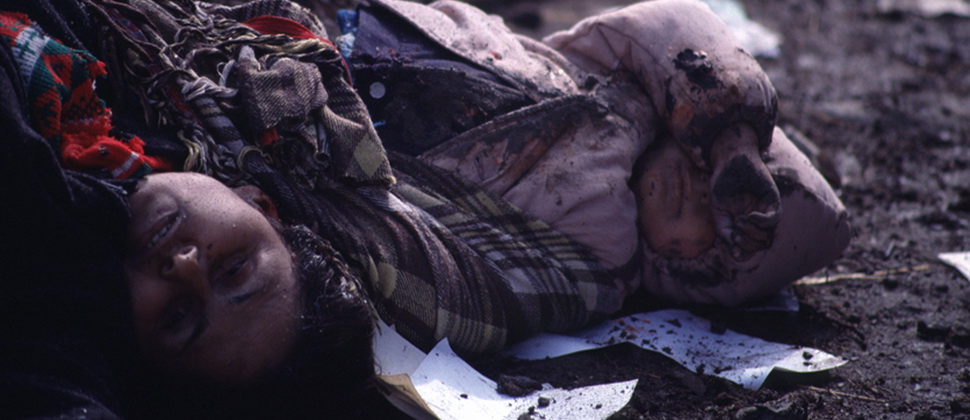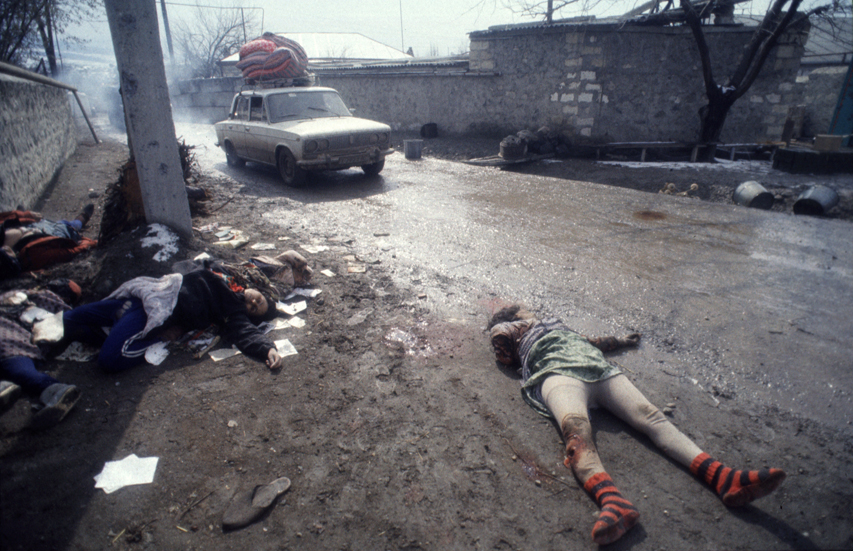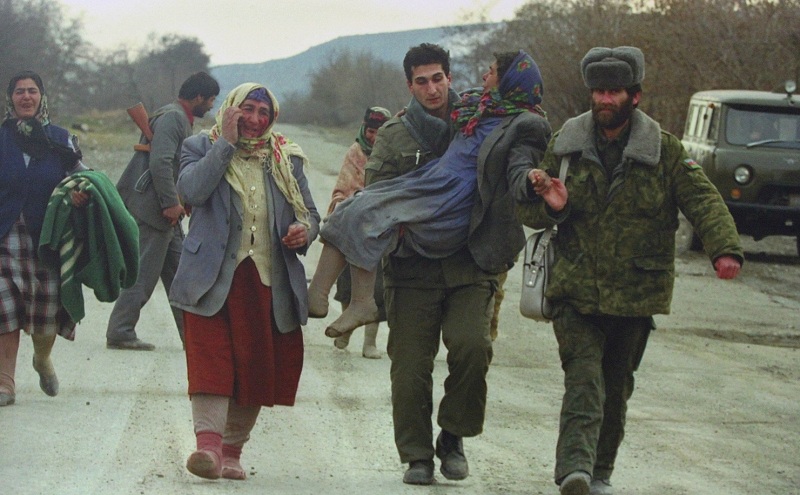“Bullets were falling like rain, houses were set on fire, everywhere was burning, like the sun was high in the sky,” Yaqub Zamanov, an eyewitness to the genocide of Azerbaijanis that was committed by Armenian forces in Khojaly, from February 25 to 26 in 1992, said.
“Then I have had the most painful feelings in my life. The horrors we suffered, the loss of our dear ones were intolerable. We felt as if we were in hell," Zamanov said in 2012, recalling the brutalities of Armenian forces against Azerbaijani civilians 26 years ago.
Azerbaijanis have recognized February 26 ever since that bloody night, which took place over a quarter of a century ago, as the Khojaly genocide and ethnic cleansing, at the hands of Armenian forces.
Late into the night on February 25, Armenian forces, backed by the Infantry Guard Regiment No. 366 from collapsing Soviet army, invaded the town of Khojaly, located in the Nagorno-Karabakh region of Azerbaijan. Armenian forces killed 613 people, including 106 women, 63 children and 70 elderly people, and took hostage 1,275 others. Another 150 Azerbaijani nationals went missing, whose fates remains unknown to this day. Those suffering major injuries or having been maimed totaled 487, including 76 children.

Armenia has made claims on Azerbaijan’s Nagorno-Karabakh region since the late 1980s, as the Soviet Union was in decline, due to its partial Armenian population alongside indigenous Azerbaijanis. But the region historically belongs to and is internationally recognized as the territory of Azerbaijan.
The events in Khojaly are widely regarded throughout Azerbaijan as the unfortunate highpoint of mass killings and ethnic cleansing of civilians by Armenian forces that occurred throughout what was a bloody, three-year war fought between the South Caucasus neighbors of Armenia and Azerbaijan, between 1991 and 1994.
Khojaly had been heavily shelled and left without power for months when it came under a sudden but well-organized attack by Armenian forces. Azerbaijanis in Khojaly were forced to flee, as they were deliberately ambushed by Armenian military patrols. Attempts by the area’s residents to escape via different directions, through mountains and forests, in order to avoid armed patrols failed. Dozens are reported to have frozen to death in what were cold winter temperatures.

“We were trying to escape through forests, but were taken hostages,” Khojaly genocide survivor Yashar Alimamadov remembered.
“[Armenian soldiers] put us in a barn inside a farm. I saw my dad, my father-in-law, my brothers and my son were there. A soldier named Karo tortured my brother Faig first, then killed him with a shot in his head and throat.”
Thomas de Waal, a Senior Fellow at Carnegie Europe, included an interview with the current Armenian President Serzh Sargsyan, who had been the Commander of Armenia’s Armed Forces during the Karabakh war, in his book about it titled “Black Garden.” De Waal noted that while answering a question about the Khojaly events Sargsyan did not deny Armenian forces’ killing Azerbaijanis.
“Before Khojali, the Azerbaijanis thought that they were joking with us, they thought that the Armenians were people who could not raise their hand against the civilian population. We were able to break that [stereotype]. And that’s what happened,” Sargsyan told De Waal.
De Waal notes in his book that Sargsyan’s words are, “suggesting that the killings may, at least in part, have been a deliberate act of mass killing as intimidation.”
Azerbaijanis take Sargsyan’s words as admittance of genocide and murder of innocent lives, and the country’s leadership has put the events on par with historical tragedies like the Holocaust during World War II and the Srebrenica massacre during the Bosnian war in 1995.
Fifteen countries from around the world such as the Czech Republic, Romania, Mexico, Colombia and Pakistan as well as Scotland from the United Kingdom and twenty state governments in the U.S., including California, Massachusetts, Texas and Pennsylvania, have officially recognized the events in Khojaly as genocide of Azerbaijanis.







 Armenian sappers commenced on Monday mine-clearance operations in the territories adjacent to the Saint Mary Church in village of Voskepar (Armenia...
Armenian sappers commenced on Monday mine-clearance operations in the territories adjacent to the Saint Mary Church in village of Voskepar (Armenia...
 Iran and Pakistan have signed eight cooperation documents in various fields, and agreed to strengthen ties to fight terrorism in the region.
Iran and Pakistan have signed eight cooperation documents in various fields, and agreed to strengthen ties to fight terrorism in the region.
 President Aliyev emphasized the critical role of the North-South Transport Corridor in fostering transport cooperation between Azerbaijan and Russi...
President Aliyev emphasized the critical role of the North-South Transport Corridor in fostering transport cooperation between Azerbaijan and Russi...



